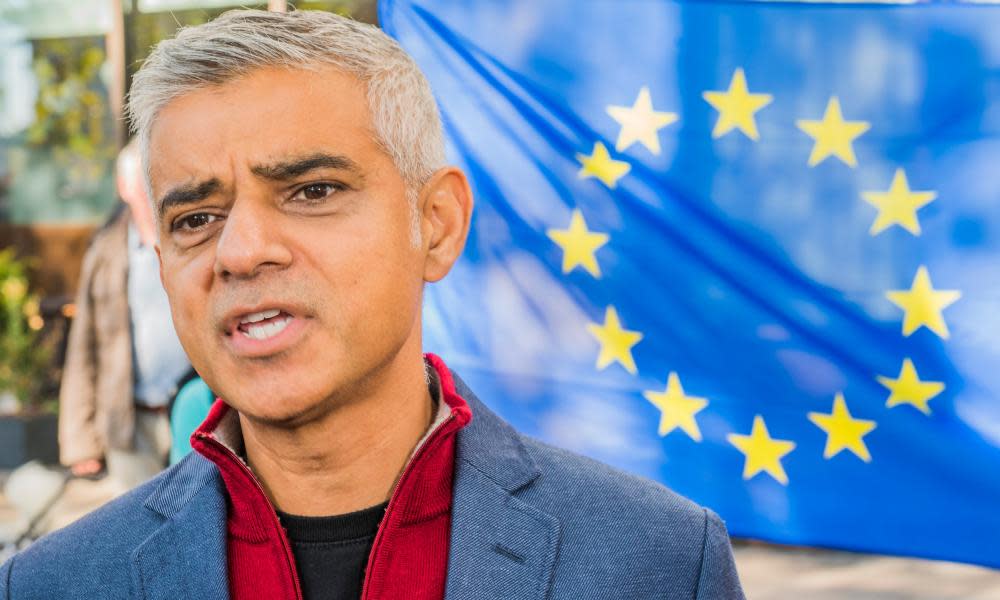Labour will be forced to oppose May's Brexit deal, Sadiq Khan warns EU

Sadiq Khan has sent a message to the EU that he believes Labour will be forced to oppose the “bad” Brexit deal that is emerging from their negotiations with Theresa May.
The mayor of London’s comments come ahead of his meeting this week with the EU’s chief Brexit negotiator, Michel Barnier, in which Khan will emphasise the need for far closer economic ties.
He will also point to Saturday’s People’s Vote march as evidence of a shift in public opinion in favour of a vote on any agreement reached in Brussels.
Khan, who joined calls for a second referendum at the weekend’s demonstration, when almost 700,000 people marched through central London, is to meet Barnier on Friday
While Khan predicts that Labour will oppose May’s final Brexit deal, Tory whips hope that enough Labour MPs can be persuade to back it in order to outnumber hardline Tory rebels. According to sources in Brussels, Barnier is said to have advised Jeremy Corbyn at a recent meeting that backing the deal would not tie a future government’s hands.
But in his meeting Khan will emphasise Labour’s opposition to the free trade deal being negotiated in Brussels. The mayor believes the “Canada-style” agreement will lead to trade barriers being erected due to the UK’s withdrawal from the single market and the customs union, and inflict damage on the financial services sector in the City of London.
Trade in services accounts for roughly 40% of UK exports to the EU and includes industries such as financial services, accountancy and the legal profession. Service industries account for 92% of London’s economy.
Khan said: “Theresa May has failed to put the national interest ahead of internal party management in the negotiations and is leading us towards either a bad Brexit deal or, worse still, no deal at all.
“This is a lose-lose situation for Britain and the EU, putting jobs, growth and living standards at risk. As mayor, I will continue to stand up for Londoners – not only by engaging directly with Europe, but by putting pressure on the government to change its damaging approach to Brexit and fighting for the rights of all EU citizens who have made London their home.”
Khan is also due to meet the British security commissioner, Julian King, on his visit to the Belgian capital. He said: “I’m looking forward to a productive trip to Brussels. As the march through the streets of London on Saturday showed, there’s still huge solidarity with Europe across the UK – both with EU citizens living here and with our European friends and allies.
“Our longstanding collaboration and deep connections are rooted in mutual interests and common values, and – whatever happens with Brexit – I will work to ensure London remains a key partner for Brussels and cities across Europe. I want everyone in Europe to know that London will always remain open to business, tourism and talent.”
Sources close to Khan emphasised that it was also important for Barnier to hear from leaders in the UK who were not from the Brexiter camp.
Giving evidence to a committee of the European parliament on Monday, Guy Verhofstadt, the chamber’s Brexit coordinator, suggested that the UK had been back-peddling on its commitments to avoid a hard border in Ireland in all circumstances. Verhofstadt added, however, that a deal was “still possible” as both sides were determined to avoid a cliff-edge Brexit next year.
Also on Monday, Barnier met the former work and pensions secretary Iain Duncan Smith, former environment secretary Owen Paterson, and ex-Ulster Unionist leader David Trimble, whose support was critical to the Good Friday agreement.
The group also included Hans Maessen, a Dutch customs expert who has been advising the European Research Group, the hard-Brexit faction led by Jacob Rees-Mogg, as well as Shanker Singham, a director at the Institute of Economic Affairs (IEA). Singham is known in Westminster as the “Brexiteers’ brain” for his hard-Brexit plan that advocates a free-trade deal with the EU.
Duncan Smith rejected suggestions the group was trying to undermine the prime minister, who is struggling to convince the cabinet to back her Brexit plan. “The prime minister gets my full support. That’s it, full stop,” he said. The group had presented some “constructive ideas” to Barnier, which, he said, were compatible with the government’s aims of “what the government says they want to achieve, which is to leave on the best terms and in the best way”.
The IEA report, presented last month, argues the UK should ditch May’s Chequers plan in favour of a looser free-trade agreement with the EU. The group declined to comment on the discussions with Barnier.

 Yahoo News
Yahoo News 
